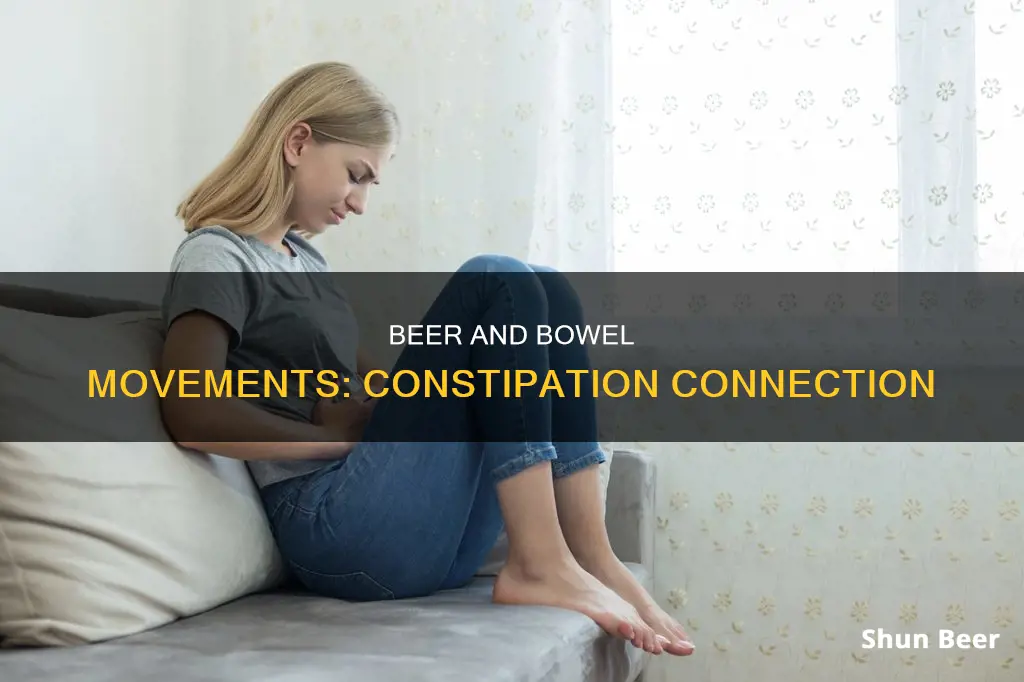
Alcohol can affect the body in several ways that can lead to constipation. Drinking beer or any other type of alcohol can cause dehydration, which can contribute to constipation. This is because when the body gets rid of more fluid than normal, it can lead to harder stools that are difficult to pass. Alcohol also inhibits digestion and compromises the functioning of the central and peripheral nervous systems, which can lead to chronic constipation. Additionally, alcohol can affect intestinal movement and slow down the muscles in the gut that push food through the digestive system, leading to constipation. For people with inflammatory bowel disease (IBD), alcohol can trigger a flare-up of symptoms, which may include constipation.
| Characteristics | Values |
|---|---|
| Alcohol content | Drinks with an alcohol content of more than 15% may slow down the movements of the muscles in the gut that push food through the digestive system. |
| Dehydration | Alcohol is a diuretic, which means it causes the body to make more urine than normal. This can lead to dehydration, which can cause constipation. |
| Electrolyte loss | Alcohol causes the loss of electrolytes such as sodium and potassium, which are essential for retaining moisture in stools. |
| Intestinal movement | Alcohol can affect intestinal movement in different ways. Drinks with an alcohol content of greater than 15% have an inhibitory effect on peristalsis, slowing down gastrointestinal motility, which can lead to constipation. |
| Gastric emptying | High doses of alcohol slow gastric emptying and bowel motility, which can be constipating. |
| Intestinal bacteria | Alcohol can cause an overgrowth of intestinal bacteria, leading to symptoms like bloating and constipation. |
What You'll Learn

Alcohol is a diuretic
Alcohol inhibits the secretion of the antidiuretic hormone (ADH), which signals the body to retain water. With less ADH, the body urinates more frequently. This diuretic effect of alcohol can also lead to dehydration and constipation.
In addition to its diuretic properties, alcohol can affect intestinal movement and slow down gastrointestinal motility, further contributing to constipation. Drinks with an alcohol content of more than 15% have an inhibitory effect on peristalsis, or intestinal contractions, which can slow the passage of food through the digestive system.
Chronic alcohol exposure can also irritate the stomach lining, leading to a condition called gastritis. This can cause stomach pain and diarrhea. Additionally, alcohol can cause an overgrowth of intestinal bacteria, which can lead to bloating and constipation.
To prevent constipation related to alcohol consumption, it is important to stay hydrated by drinking water or other fluids and to drink in moderation.
Hydrometer Basics: Crafting Beer Perfection
You may want to see also

Alcohol affects intestinal movement
Alcohol can affect intestinal movement in several ways. Firstly, it inhibits digestion and suppresses intestinal peristalsis, reducing the urge to move your bowels. High doses of alcohol can slow gastric emptying and bowel motility, leading to constipation. This is particularly true for drinks with an alcohol content of more than 15%. On the other hand, lower doses of alcohol and beverages with lower alcohol content, such as wine and beer, can increase gastric emptying rates.
Secondly, alcohol is a diuretic, which means it increases urine production. This can lead to dehydration, as the body loses more fluid than usual. Dehydration can contribute to constipation because the body needs water for stool to absorb. Softer stools are bulkier and easier to pass, while dehydration can result in hard, dry stools that are difficult to pass.
Thirdly, alcohol can irritate the intestinal lining, causing inflammation in the gut. This can lead to an overgrowth of intestinal bacteria, resulting in symptoms like bloating and constipation. Additionally, alcohol can affect the blood sugar level, which may cause a loss of bowel function control and lead to diarrhea.
Chronic alcohol exposure can also lead to gastritis, or irritation of the stomach lining, which can cause stomach pain and diarrhea. Furthermore, alcohol can interfere with constipation remedies and medications, as it is metabolized by the liver, which is also responsible for processing many drugs. Therefore, drinking alcohol while taking constipation medications may impact their effectiveness.
Beer and TB Skin Test: Safe or Not?
You may want to see also

Alcohol causes dehydration
Alcohol is a diuretic, which means it causes the body to produce more urine than usual. This leads to dehydration because a person is urinating more frequently but not taking in enough fluids. Dehydration can cause constipation as the large intestine will take as much water as possible from waste before it leaves the body. This reabsorption results in hard, dry stools that are difficult to pass.
Alcohol inhibits the release of the antidiuretic hormone (ADH), which signals the body to retain water. With less ADH, the body urinates more, and when the body loses more fluid than normal, it can become constipated.
To prevent dehydration and constipation, it is important to drink plenty of water or other hydrating beverages when consuming alcohol. Alternating alcoholic drinks with soft drinks or water can help prevent dehydration and constipation.
Alcohol also affects the digestive system, causing intestinal inflammation and preventing the gut from absorbing nutrients properly. This can result in more waste being produced, leading to more frequent bowel movements. Additionally, alcohol can slow down gastrointestinal motility, which can contribute to constipation.
Chronic alcohol exposure can lead to irritation of the stomach lining, known as gastritis, resulting in stomach pain and diarrhoea. Alcohol can also cause a loss of electrolytes, such as sodium and potassium, essential for retaining moisture in stools. The loss of electrolytes can further contribute to dehydration and constipation.
Beer and Workout: A Healthy Mix?
You may want to see also

Alcohol inhibits digestion
Additionally, alcohol causes the loss of electrolytes such as sodium and potassium, which are essential for retaining moisture in stools. The body tries to recover these electrolytes from the bowel contents, further contributing to dehydration and constipation. Alcohol also inhibits stomach digestion and delays stomach emptying, a condition known as gastroparesis. This can lead to the rotting of undigested proteins, triggering violent vomiting and further dehydration.
The impact of alcohol on digestion is influenced by the type and amount consumed. Drinks with higher alcohol content, exceeding 15%, tend to have a more inhibitory effect on digestion. However, beverages with lower alcohol content, such as wine and beer, can increase gastric emptying rates. Chronic alcohol consumption can also lead to intestinal inflammation and irritation of the stomach lining (gastritis), causing stomach pain and diarrhea.
To prevent constipation related to alcohol consumption, it is crucial to stay hydrated by drinking water or other fluids and ensuring adequate electrolyte intake. Drinking in moderation and eating before consuming alcohol can also help mitigate the inhibitory effects of alcohol on digestion.
Drinking Beer While Taking Cardizem and Ceftin: What's the Verdict?
You may want to see also

Alcohol affects blood sugar levels
Alcohol can affect blood sugar levels in several ways. Firstly, it inhibits digestion and depresses glucose metabolism. When you drink alcohol, your liver needs to break it down, and while doing so, it stops releasing glucose. This can cause your blood sugar level to drop quickly, potentially leading to hypoglycemia. The risk of low blood sugar remains for hours after your last drink, and the more drinks you have, the higher the risk. Beer and sweetened wines contain carbohydrates, which can also raise blood sugar levels.
Alcohol also stimulates your appetite, which can lead to overeating and affect your blood sugar control. Additionally, alcoholic drinks are often high in calories, making it more challenging to lose excess weight and manage diabetes. Alcohol may also interfere with the effects of diabetes medications, increasing the risk of low or high blood sugar.
It is important to note that the effects of alcohol on blood sugar levels can vary depending on the amount consumed. Moderate drinking may cause blood sugar to rise, while excessive drinking can lead to a decrease in blood sugar levels.
To manage blood sugar levels while drinking, it is recommended to drink in moderation, preferably with food, and to avoid sugary mixed drinks, sweet wines, or cordials.
Drinking Non-Alcoholic Beer: Is It Safe to Drive?
You may want to see also







